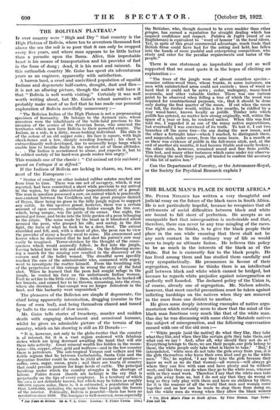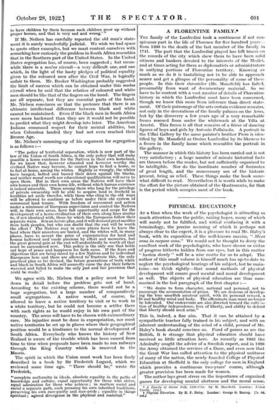THE BLACK MAN'S PLACE IN SOUTH AFRICA.* MR. PETER NIELSEN
has written a very thoughtful and judicial essay on the future of the black races in South Africa. He is not particularly hopeful, because he recognizes that all
settlements of social difficulties between black and white are bound to fall short of perfection. He accepts as an unarguable fact that miscegenation is undesirable and that, therefore, there can never be any true mingling of the races.
The right aim, he thinks, is to give the black people their place in the sun while ensuring that there shall not be any such contact in the ordinary way of life as would seem to imply an ultimate fusion. He believes this policy to be as much in the interests of the black as of the white. But he is eminently fair to the black people. He has lived among them and has studied them carefully and very sympathetically. He pronounces in favour of their segregation, not because he thinks there is an intellectual gulf between black and white which cannot be bridged, but because he regards white prejudice against miscegenation as perfectly well founded. The declared policy of the Union is, of course, already one of segregation. Mr. Nielsen admits, however, that most careful precautions must be taken against inflicting hardships on the natives when they are removed in the mass from one district to another.
He gives some deeply interesting examples of native argu- mentation which certainly seem to show that the mind of the black man functions very much like that of the white man. One day he was discussing with some elderly Matabele natives the subject of miscegenation, and the following conversation ensued with one of the old men :-
" White people [said the native] do what they like, they take what they like, and when they like certain girls they take them, and what can we say ? And, after all, why should they not do so ? Everything belongs to them, we are their people, our girls belong to
them, the white people only take what is theirs to take.' But,' I interpolated, ' white men do not take the girls away from you, it is the girls themselves who leave their own kind and go to the white men.' No,' he replied, I say they take the girls because they know as well as we do that women—all women—will always go where they can live with ease and have plenty and be without work, and this they can do when they go to the white man, whereas with us they must work Therefore I say that the white men take the girls away from us, but I do not say that they do wrong so long as they only play with them and have no children by them, for it is the manner of all the world that men and women come together and no law can be made to stop them from doing so, but the white men do wrong when they allow the black women
• The Black ifsie's Place in South Africa. By Peter Melees. Cape Town: Juts and Co, to have children by them because such children grow up without proper homes, and that is very sad and wrong.' "
If Mr. Neilsen has carefully reported the old man's state- ment it is surely wonderfully judicial. We wish we had space to quote other examples, but we must content ourselves with remarking how curiously the problem in South Africa resembles that in the Southern part of the United States. In the United
States segregation has, of course, been suggested ; but mean- while there is a moeus vivendi—a very difficult one, and one which, in the light of the hasty pledges of political equality given to the coloured men after the Civil War, is logically unfair to them. Mr. Booker Washington probably suggested the limit of success which can be obtained under this modus rivendi when he said that the relation of coloured and white men should be like that of the fingers on the hand. The fingers are all separate, but they are essential parts of the hand.
Mr. Nielsen convinces us that the pretence that there is an ultimate intellectual difference between black and white cannot be maintained. Even if the black men in South Africa were more backward than they are it would not be possible to predict what they might develop into later. The American Indians command respect for their mental abilities, but when Columbus landed they had not even reached their Bronze Age.
Mr. Nielsen's summing-up of his argument for segregation is as follows :-
" The policy of territorial separation, which is now part of the law of the Union of South Africa, is the only policy that will make possible a home existence for the Natives in their own homeland, for we know that, however educated and however worthy the civilised Native may become, he cannot hope to find a home, or to feel at home, among the whites. Rightly or wrongly, the whites have banged, bolted and barred their doors against the blacks, and neither moral worth nor educational qualifications will serve to open them. But in their own areas the Natives will have their own homes and their own home-life, without which human existence is indeed miserable. Those among them who long for the privilege of private ownership will be able to acquire land in freehold in localities set aside therefor, while those who cling to the old ways will be allowed to continue as before under their old system of communal land tenure. With freedom of movement and action under a minimum of European supervision and control the Natives will, in their own areas, have full opportunity and scope for the development of a home-civilisation of their own along lines similar to, if not identical with, those by which the Europeans follow their separate ways. It is an heroic plan, and it will demand great sacrffice from both peoples, but who can doubt that the end will be worth the effort ? The Natives may in some places have to leave the land where their ancestors are buried, and the whites will, in many places, have to accept the price of expropriation for land and houses hallowed and made precious by effort and memories, but the great general gain at the end will undoubtedly be worth all that must be surrendered now. This policy is the only one that holds out hope of peace and happiness for both races. If the fears and objections that are being raised by a few Natives and by individual Europeans here and there are allowed to' frustrate this, the only practical plan so far devised, the future generations of both white and black in South Africa will assuredly curse the day their fathers wavered and failed to make the only just and fair provision that could be made."
We agree with Mr. Nielsen that a policy must be laid
down in detail before the problem gets out of hand. According to the existing scheme, there would not be a huge segregation, but a large number of comparatively
small segregations. A native would, of course, be allowed to leave a native territory to visit or to work in a white territory, but he could not become a settler there
with such rights as he would enjoy in his own part of the country. The areas will have to be chosen with extraordinary care. No injustice must be done in expropriation, nor must native territories be set up in places where their geographical position would be a hindrance to the normal development of South Africa. Everybody who knows the history of New Zealand is aware of the trouble which has been caused from time to time when proposals have been made to run railways through the King Country which is reserved to the Maoris.
The spirit in which the Union must work has been finely described in a book by Sir Frederick Lugard, which we reviewed some time ago. " There should be," wrote Sir Frederick,
"complete uniformity in ideals, absolute equality in the paths of knowledge and culture, equal opportunity for those who strive, equal admiration for those who achieve ; in matters social and racial a separate path, each pursuing his own inherited traditions, preserving his own race-purity and race-pride ; equality in things spiritual ; agreed divergence in the physical and material."











































 Previous page
Previous page